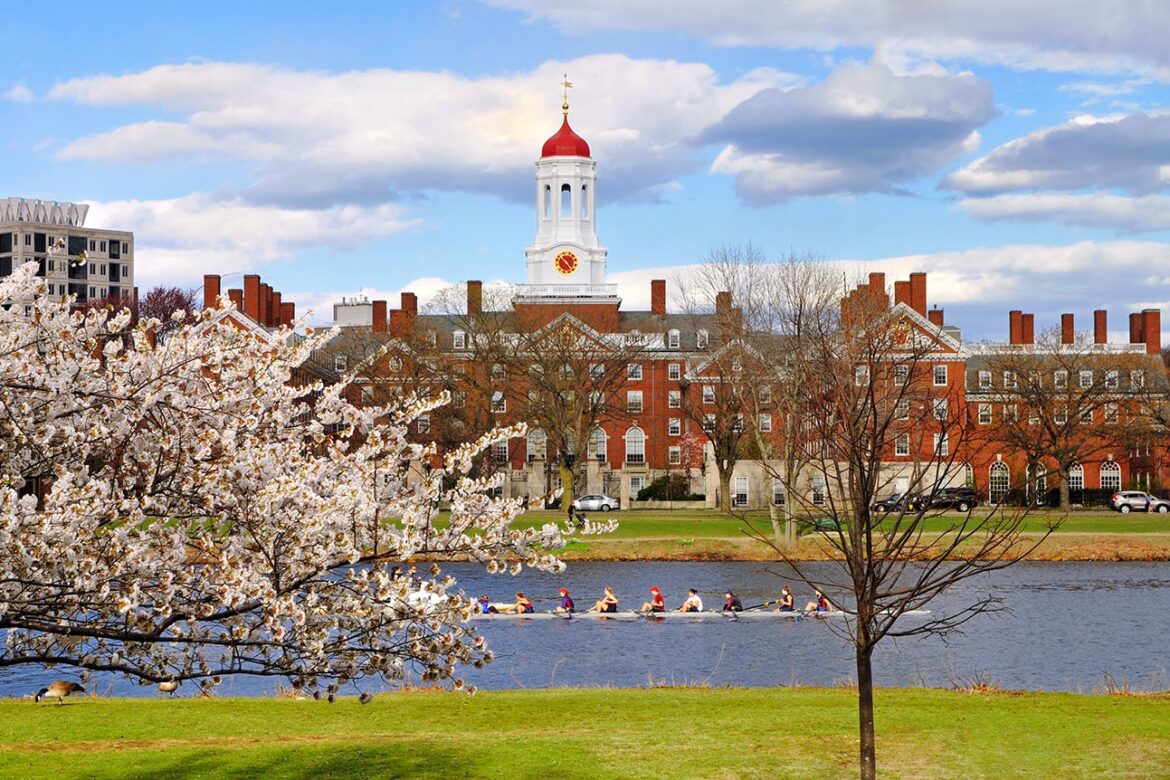Introduction
Harvard University, established in 1636, is the oldest institution of higher education in the United States. It has long been synonymous with academic excellence, innovation, and leadership across various fields. Located in Cambridge, Massachusetts, this Ivy League university is renowned for its prestigious faculty, cutting-edge research, and diverse student body. Over the centuries, Harvard has shaped the world by producing some of the brightest minds in history and playing a pivotal role in advancements across education, science, politics, and the arts.
Harvard’s History and Foundation

Harvard was founded by the Massachusetts Bay Colony in the early 17th century, originally intended to train ministers. The university’s first benefactor, John Harvard, bequeathed his library and half of his estate to the institution in 1638, and the university was subsequently named in his honor. Over the years, Harvard transitioned from a theological school into a broad-based institution of higher learning, eventually becoming the powerhouse it is today.
The first Harvard graduates were trained in law, theology, and the classics, and the university’s early curriculum reflected these disciplines. The 19th and 20th centuries saw Harvard diversify its academic offerings, establishing groundbreaking programs in the sciences, social sciences, and humanities. Harvard also became an early adopter of the modern research university model, which emphasizes interdisciplinary study, cutting-edge research, and global collaboration.
Academic Reputation and Research Excellence

Harvard consistently ranks as one of the top universities in the world. Its diverse array of disciplines and academic programs is complemented by its commitment to research. Harvard has produced 161 Nobel Laureates, more than any other university, and its faculty includes numerous recipients of prestigious awards, including Pulitzer Prizes, Fields Medals, and MacArthur Fellowships. Harvard’s graduate schools, such as the Harvard Business School, Harvard Law School, and the Harvard Medical School, are consistently ranked among the best in their respective fields.
Harvard’s research initiatives cover virtually every area of knowledge, from genomics to climate change, artificial intelligence, and public health. The university is home to more than 100 research centers, including the Harvard-Smithsonian Center for Astrophysics and the Harvard Kennedy School’s Belfer Center for Science and International Affairs, which drive global research on security, policy, and technology.
One of Harvard’s hallmark traits is its ability to bring together interdisciplinary teams to tackle the world’s most pressing challenges. Researchers from different fields collaborate on groundbreaking work, fostering an environment where innovations emerge at the intersection of disciplines.
Harvard’s Impact on Society

Over the centuries, Harvard has not only advanced knowledge but has also played an essential role in shaping society. As an incubator for leaders, thinkers, and change-makers, Harvard’s alumni network includes influential figures in politics, business, law, science, and the arts.
Notable alumni include:
- Barack Obama, the 44th President of the United States, who earned his law degree from Harvard Law School.
- Mark Zuckerberg, the co-founder of Facebook, who studied computer science and psychology at Harvard before leaving to launch the social media platform.
- Bill Gates, the co-founder of Microsoft, who attended Harvard before dropping out to start one of the world’s most successful companies.
- Al Gore, former U.S. Vice President and climate change advocate, who graduated with honors from Harvard College.
Additionally, Harvard has significantly contributed to societal advancements through its public service initiatives. The Harvard Global Health Institute focuses on improving health and reducing inequality worldwide, while the Harvard Kennedy School develops leaders who work toward improving public policy and governance globally.
Diversity and Inclusion at Harvard
Harvard has made significant strides toward inclusivity in its student body, faculty, and research. The university admits students from diverse socioeconomic backgrounds and provides various resources to ensure all students have equal access to opportunities. Harvard also offers a range of scholarships and financial aid packages that ensure students from all walks of life can pursue an education at one of the world’s most prestigious institutions.
The university has worked to increase representation from underrepresented groups in its faculty and student body, launching initiatives and outreach programs to encourage diversity. Harvard is also committed to advancing the cause of gender equality and has implemented numerous policies and programs aimed at supporting women and underrepresented minorities in academia.
The Campus and Harvard Yard

Harvard’s main campus is located in the heart of Cambridge, Massachusetts, just across the Charles River from Boston. Harvard Yard, the historical and central part of the campus, is home to several iconic buildings, including Harvard Hall, Memorial Church, and Widener Library, one of the largest libraries in the world.
The campus is a blend of traditional and modern architecture, housing more than 12 million books in its libraries and serving as a hub for students, faculty, and staff from around the world. The Harvard Art Museums, Harvard Museum of Natural History, and Harvard Theatre Collection provide opportunities for cultural enrichment and interdisciplinary learning.
Harvard in the Digital Age
As the world moves increasingly into the digital age, Harvard has been quick to adapt to the new technological landscape. The university has embraced the role of digital learning and online education through initiatives like Harvard Online Learning, which offers a wide range of online courses in subjects from computer science to history and business management. Additionally, Harvard’s Institute for Quantitative Social Science and Berkman Klein Center for Internet & Society focus on the ethical use of technology and research on the digital impact on society.
Conclusion

Harvard University remains one of the most prestigious academic institutions globally, shaping the future of education, research, and global leadership. Through its unparalleled history, distinguished alumni, world-class faculty, and commitment to social responsibility, Harvard continues to influence societies across the globe.
Whether you are interested in pursuing a career in science, business, politics, or the arts, Harvard offers an environment of learning, opportunity, and innovation that is second to none. Its commitment to academic rigor, coupled with its global outreach and diversity initiatives, ensures that Harvard will remain at the forefront of education for many years to come.
Author Profile
- Syed Tahir Abbas is a Master's student at Southwest University, Chongqing, specializing in international relations and sustainable development. His research focuses on U.S.-China diplomacy, global geopolitics, and the role of education in shaping international policies. Syed has contributed to academic discussions on political dynamics, economic growth, and sustainable energy, aiming to offer fresh insights into global affairs.
Latest entries
 U.S. Foreign PolicyFebruary 2, 2026AI and Grand Strategy: The Case for Restraint – Navigating the Future of American Power
U.S. Foreign PolicyFebruary 2, 2026AI and Grand Strategy: The Case for Restraint – Navigating the Future of American Power National SecurityJanuary 31, 2026Treating China’s Connected Energy Systems as a National Security Risk
National SecurityJanuary 31, 2026Treating China’s Connected Energy Systems as a National Security Risk Global HealthJanuary 29, 2026The Future of the WHO—and How the United States Can Shape It
Global HealthJanuary 29, 2026The Future of the WHO—and How the United States Can Shape It Global TradeJanuary 22, 2026Trump Cancels Tariffs on European Nations Over Greenland Pursuit?
Global TradeJanuary 22, 2026Trump Cancels Tariffs on European Nations Over Greenland Pursuit?



10 comments
My partner and I stumbled over here from a different web address and thought I might check things out. I like what I see so i am just following you. Look forward to looking over your web page for a second time.
Very interesting points you have observed, regards for posting.
I loved as much as you’ll receive carried out right here. The sketch is attractive, your authored subject matter stylish. nonetheless, you command get bought an shakiness over that you wish be delivering the following. unwell unquestionably come more formerly again since exactly the same nearly a lot often inside case you shield this increase.
It is in reality a nice and useful piece of info. I¦m happy that you just shared this helpful info with us. Please keep us up to date like this. Thank you for sharing.
I was studying some of your posts on this website and I think this internet site is real informative! Continue putting up.
I am no longer certain where you’re getting your info, however great topic. I must spend a while studying more or working out more. Thank you for magnificent information I was in search of this information for my mission.
What¦s Happening i’m new to this, I stumbled upon this I’ve found It absolutely useful and it has aided me out loads. I hope to contribute & aid other users like its helped me. Great job.
I simply could not depart your web site before suggesting that I extremely enjoyed the standard information a person supply on your visitors? Is gonna be back ceaselessly in order to check up on new posts.
I got good info from your blog
Howdy very nice blog!! Man .. Excellent .. Wonderful .. I will bookmark your website and take the feeds additionally…I’m glad to search out a lot of useful information here within the put up, we want work out extra strategies in this regard, thank you for sharing.